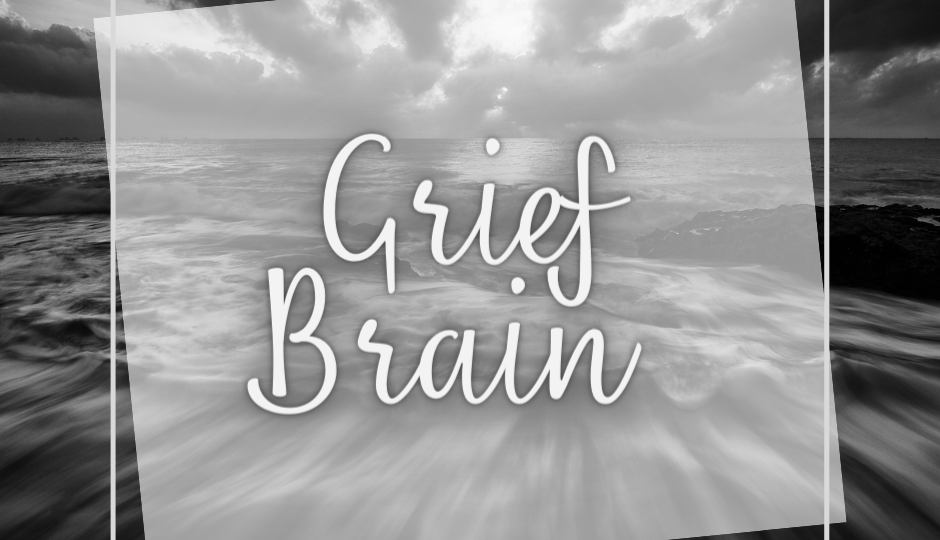Can we talk for a minute about this thing called 'Grief Brain'?
It feels so silly to even talk about this, but it’s a REAL THING. I have always been a productive person. I feel like you must be with running a business, a family our size, and all the things that life throws at you on the daily. I remember shortly after Alli was born feeling like I was in a fog. It would take me hours to get ready and out the door each morning. My house was a mess. I was forgetting a lot of things, and overall, just overwhelmed with caring for a new life. When Sara was born, I was more put together. I had a routine, and we just slipped her into that routine fairly seamlessly.
Then the twins came – and routine became a necessity. I remember when they were released from the NICU our nurse telling us that the entire NICU staff thrived on babies being in a set routine. Every four hours we would feed, change, and put back down for rest. We kept this schedule and of course gradually shifted it over time, but that routine was essential for survival. It seems all we did that first year was survive. Adding not one, but two lives into our household threw our routine off from what it had been, but also created an amazing dynamic to our home.
It seems through life that routine changes like the seasons. We go through these seasons and maybe it has something to do with the length of sunlight in our days, or the school day hours, or even work demands; but, our routine has generally stayed the same. Sure, each day has different appointments or demands of time, but our family has always thrived on routine. I have even gone so far as to call organization one of my superpowers.
My kids know what dinners we are having each day, because I have a menu board on the wall in the kitchen.
I grocery shop on Saturday mornings, so if something needs to be purchased, better put it on the list, or wait until the next week!
Meal prep is on Sunday after church.
Appointments? On the door to the garage and in Google calendar, with a personal invite to put it on yours. I also carry a personal calendar where they are written down.
Lists? They’re everywhere, and each one has a purpose.
I write all of this down and it seems excessive. But to me, it’s necessary. I was told a long time ago, if you write something down, you earn the right to forget it. So for me, I write things down, make a list, put it in a calendar – and as long as I reference back to that (a whole other lesson here), I’m golden.
Let me say, it is not a badge of honor to be organized. However, for our family it is just what has worked.
..then grief came knocking, and all of this crumbled.
I find myself saying, ‘I am so sorry, I just forgot’ or ‘please email me so I don’t forget’ more than I like these days.
Cooking dinner is a chore. If I’m really being honest, just getting groceries has been a chore (and I order them online).
There is a stack of work sitting on my desk that is begging for attention.
I have countless Thank You cards to write. (really good problem to have)
The paperwork that comes with the loss of someone is insurmountable and finding the right person to help you through it is also quite challenging – as every situation is just a bit different and requires personal attention. There is no one right way.
I find myself prefacing conversations with, have I told you this already? Chances are, I have – multiple times.
I am learning a real sense of patience and empathy with myself during this time. All of this, I’m learning, are symptoms of Grief Brain. Some might call it Brain Fog.
I am also learning that this is a real natural part of grief. Our brains are overloaded with all the thoughts of grief, sadness, loneliness, loss, and many other feelings. My brain is trying to rewrite conversations and decoding our lives as their new identity. For example, the word spouse implies two people. Now there’s just one. I am learning a new set of rules to operate in my life.
‘Grief is a heart-wrenchingly painful problem for the brain to solve, and grieving necessitates learning to live in the world with the absence of someone you love deeply, who is ingrained in your understanding of the world. This means for the brain, your loved one is simultaneously gone and also everlasting, and you are walking through two worlds at the same time. You are navigating your life despite the fact that they have been stolen from you, a premise that makes no sense, and that is both confusing and upsetting.’ – Mary-Frances O’connor, PhD, author of The Grieving Brain
I also read this recently and it made complete sense to me on the difference between grief and grieving:
Grief is the emotional state that just knocks you off your feet and comes over you like a wave. Grieving necessarily has a time component to it. Grieving is what happens as we adapt to the fact that our loved one is gone, that we’re carrying the absence of them with us. And the reason that this distinction make sense is, grief is a natural response to loss – so we’ll feel grief forever. A woman who lost her mother as a young person is going to experience that grief on her wedding day because it’s a new moment where she’s having a response to loss.
But ‘grieving’ means that our relationship to grief changes over time. So the first time, maybe even the first 100 times, you’re knocked off your feet with grief, it feels terrible and awful and unfamiliar. But maybe the 101st time, you think to yourself, ‘I hate this, I don’t want this to be true. But I do recognize it, and I do know that I will get through the wave.’
Our brains are hyper-focused on all the feelings and symptoms of grief. It’s overloaded with this, which is leaving little room for everyday tasks, causing this Grief Brain. We are in a constant state of these new waves and learning how to deal with them. I love the ocean, but I just want to get out right now. The waves seem overwhelming. The seas are rough. But, I do see the shoreline.
I know that this will not last forever.
It is just a storm we are in right now.
Grief is like someone turned up the volume dial all of a sudden.
Here’s something I do know. The brain is excellent at solving problems. In fact, our brains exist for this function. But it also struggles to learn new information that cannot be ignored, like losing a loved one. Grieving requires us to literally scratch the map that our brain has created for our lives with our loved one and rewrite it.
I have also read that the brain cannot comprehend something as abstract as death. That when a person loses a loved one the brain doesn’t understand this. It believes that the loved one has essentially ‘ghosted’ us – stopped returning calls, stopped communicating, cutoff all connection all at once. And it has. The brain doesn’t understand it as death, just a loss of connection. It assumes they are missing and will eventually be found. The idea that the person is simply no longer, it not logical.
We have to rewire our brains to this ‘new normal’, into a meaningful life with the one we lost.
This is going to take time.
Reality is, it’s going to take a lot longer than I want or expect it to.
Joe was always the patient one in this relationship. I told him often, I was so glad our kids had him for a daddy, because he brought such patience and understanding to parenting.
It’s my turn.
I must carry that torch for him now.
My brain has to learn how to do this too.
I don’t write all of this for sympathy.
I write this more for understanding.
My brain is in overload right now. It does not understand this new normal.
It will.
It’s just going to take some time.
I am learning that journaling is so helpful. It allows me to get my feelings out on paper, without burdening anyone else. That sounds weird to say, but this is so personal, I am really the only one that can understand my grief – and I don’t have the energy to explain it to anyone else. Writing helps me validate what I’m feeling.
If you have made it this far, thanks for hanging in there with me. The more I talk about it, the more I realize I am not alone, and this is a process that I can do with time.
If you’re in the bucket that you actually understand all of what I just wrote, let me say I am so very sorry. To understand is to have lived it, and that is not something you wear as a badge of honor. That is something you walk with, you work through, and hopefully look back on and say, thanks God, I knew you had me this whole time.


